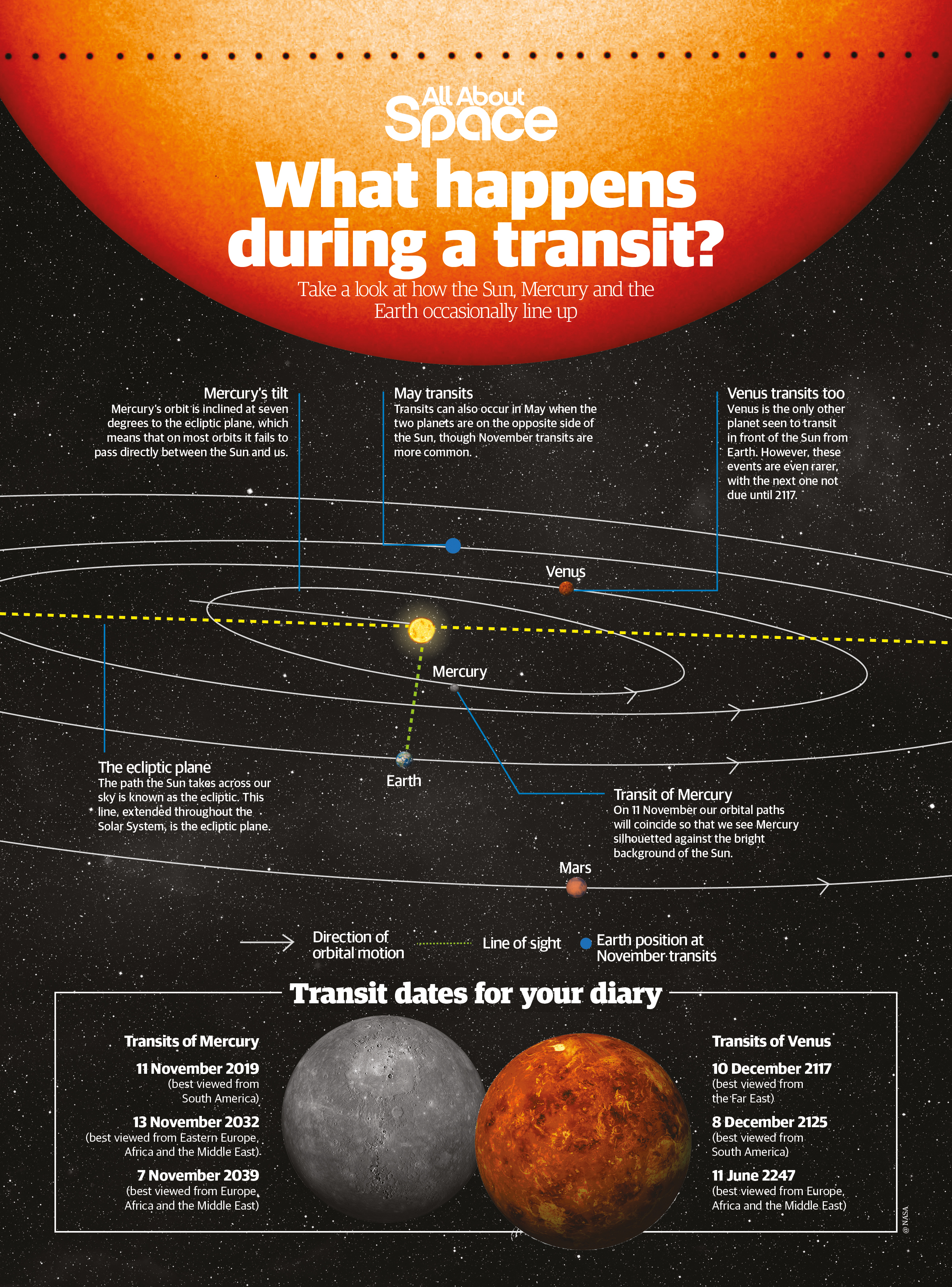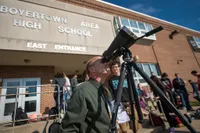Rare Transit of Mercury, the Last Until 2032, Occurs Today! Here's What to Expect
You'll have to wait over a decade for the next one!
The planet Mercury is going to cross across the sun today (from Earth's perspective) starting at 7:34 a.m. EST (12:34 p.m. GMT). Below is your guide to watch the seminal event safely and with fun.
The event, a rare transit of Mercury, will take about 5.5 hours and it's worth making the time to watch at least some of it, since the next time such an event will happen will be 2032. The event is visible in the Americas, the Atlantic and Pacific oceans, New Zealand, Europe, Africa and western Asia. If you can't catch it due to clouds, location or scheduling issues, you can always look at it online.
NASA has a master list of astronomy clubs across the country that will host local events. These events are a great spot to safely view the sun using specially equipped telescopes. NEVER look at the sun without protective equipment – even for a few moments. You will need special solar glasses for your eyes, and special filters for your binoculars or telescope. Here's a guide of the gear you will need to observe the Mercury transit.
- Mercury Transit 2019: Where and How to See It on Nov. 11
- Video: The Mercury Transit of 2019 Explained
- How to Watch the Mercury Transit Live Online
- Find a Mercury Transit 2019 Viewing Event Near You!
According to Space.com's skywatching columnist Joe Rao, you will need a magnification of at least 50x to see the planet on the sun's surface, since Mercury is only about 1/194th the diameter of the sun.
Mercury will appear darker than any sunspots on the surface of the sun, although the surface has remained relatively clear in recent days because the sun is in a quieter period in its 11-year cycle. Rao also has a timetable of transit events and a weather forecast available for several areas of the United States to help you decide your skywatching schedule.
| Header Cell - Column 0 | UTC | EST | CST | MST | PST |
|---|---|---|---|---|---|
| Contact I | 12:35 | 7:35 a.m. | Not visible | Not visible | Not visible |
| Contact II | 12:37 | 7:37 a.m. | Not visible | Not visible | Not visible |
| Greatest | 15:19 | 10:19 a.m. | 9:19 a.m. | 8:19 a.m. | 7:19 a.m. |
| Contact III | 18:02 | 1:02 p.m. | 12:02 p.m. | 11:02 a.m. | 10:02 a.m. |
| Contact IV | 18:04 | 1:04 p.m. | 12:04 p.m. | 11:04 a.m. | 10:04 a.m. |
If you can't catch the event in person, there are several livestreams (or webcasts that are nearly live) that will allow you see the transit on the Internet, completely safely. NASA's Solar Dynamics Observatory will post several videos, and both Slooh and The Virtual Telescope Project will host livestreams from their respective observatories in the Canary Islands and Rome. More details on how to find these livestreams can be found here.
We'd also love to see your best photos or videos of the event. Feel free to share what you do with us on at spacephotos@space.com. We may feature your multimedia in a future Space.com story.
Breaking space news, the latest updates on rocket launches, skywatching events and more!
Today's event will be the fourth of 14 transits that Mercury will have during the 21st century, so make sure to tune into this historic event.
Mercury Transit 2019: The Gear You Need to Watch It Safely
Here's a brief rundown of the gear you need to safely watch the transit, either first-hand or live online.
- Teach Your Kids About the Mercury Transit of 2019 with This NASA Guide
- How to Safely Observe the Sun (Infographic)
- Make a Safe Sun Projector with Binoculars (Video)
Follow Elizabeth Howell on Twitter @howellspace. Follow us on Twitter @Spacedotcom and on Facebook.


Elizabeth Howell (she/her), Ph.D., was a staff writer in the spaceflight channel between 2022 and 2024 specializing in Canadian space news. She was contributing writer for Space.com for 10 years from 2012 to 2024. Elizabeth's reporting includes multiple exclusives with the White House, leading world coverage about a lost-and-found space tomato on the International Space Station, witnessing five human spaceflight launches on two continents, flying parabolic, working inside a spacesuit, and participating in a simulated Mars mission. Her latest book, "Why Am I Taller?" (ECW Press, 2022) is co-written with astronaut Dave Williams.


